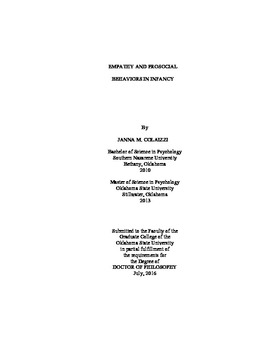| dc.contributor.advisor | Thomas, David G. | |
| dc.contributor.author | Colaizzi, Janna M. | |
| dc.date.accessioned | 2017-02-22T22:08:55Z | |
| dc.date.available | 2017-02-22T22:08:55Z | |
| dc.date.issued | 2016-07 | |
| dc.identifier.uri | https://hdl.handle.net/11244/48793 | |
| dc.description.abstract | Empathic and prosocial behaviors foster cooperation between individuals, making such behaviors essential to successful social functioning. Infants are generally thought to have the foundation for, but be developmentally incapable of, prosocial behaviors because of their physical and cognitive limitations. To address this, the current study had three aims: 1) to replicate the findings of Hamlin and colleagues (2007) in which infants make social evaluations and prefer a helpful character to a harmful one, 2) to utilize new methodology to assess infants' propensity for prosocial behaviors toward third parties, and 3) to assess potential predictive factors of these infants' prosocial behaviors. Forty-two infants between 9 and 11 months old were first shown a replication of the puppet show used in Hamlin and colleagues (2007) and then were taught through operant conditioning techniques to manipulate the characters in the puppet show in order to either help or hinder the puppet in need. Infant motor development and salivary cortisol, parental social support, and mother-infant behavioral and physiological synchrony were measured. Infants did not reliably choose either the helper or hinderer characters, thus not successfully replicating previous research. However, when helping the character in need, the infants who initially preferred the helper also subsequently responded more quickly and frequently than their peers who initially preferred the hinderer or those who were in the control group. The possibility of perceptual preferences affecting these behaviors is discussed as well as the influences on these prosocial behaviors of infant motor skills and salivary cortisol and mother-infant behavioral and physiological synchrony. These results provide preliminary, albeit limited, support for the early emergence of prosocial behaviors in infancy through the use of developmentally appropriate procedures. | |
| dc.format | application/pdf | |
| dc.language | en_US | |
| dc.rights | Copyright is held by the author who has granted the Oklahoma State University Library the non-exclusive right to share this material in its institutional repository. Contact Digital Library Services at lib-dls@okstate.edu or 405-744-9161 for the permission policy on the use, reproduction or distribution of this material. | |
| dc.title | Empathy and prosocial behaviors in infancy | |
| dc.contributor.committeeMember | Byrd-Craven, Jennifer | |
| dc.contributor.committeeMember | Burkley, Melissa Anne | |
| dc.contributor.committeeMember | Morris, Amanda Sheffield | |
| osu.filename | Colaizzi_okstate_0664D_14781.pdf | |
| osu.accesstype | Open Access | |
| dc.type.genre | Dissertation | |
| dc.type.material | Text | |
| thesis.degree.discipline | Psychology | |
| thesis.degree.grantor | Oklahoma State University | |
